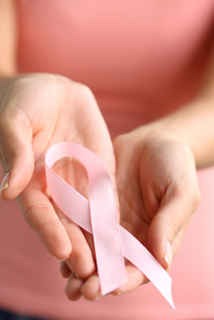More Than Pink and Teal
Permanent link
In the United States, we’re often presented with two different views of cancer. Last month, the Chicago skyline was lit up teal, for ovarian cancer awareness; this month, it’s impossible to avoid the color pink. The other public face is that of the celebrity who recently passed away: yesterday, we lost Steve Jobs, founder of Apple and creator of nearly every gadget you hold dear, to pancreatic cancer.
Certainly these are engines for cancer awareness within our society, but all too often we tweet or we buy a snack with a pink ribbon on the label and that’s where our involvement ends. My fellow Jews, there’s more you need to know, and more that you can do to make cancer awareness work for you.
Ashkenazi Jews are at greatly increased risk for mutations in their BRCA genes. BRCA stands for BReast CAncer; these genes are responsible for keeping the cells in your breasts healthy. When these genes start to malfunction, sometimes in women as young as their early 20s, that individual’s lifetime risk of developing breast cancer, ovarian cancer or both is greatly increased when compared to the rest of the population. Women who discover, through genetic testing, that they are BRCA-positive often call themselves “previvors” – pre-survivors. They have a number of options for managing their situation, ranging from surveillance to surgery to remove their breasts and ovaries, reducing their lifetime risk of developing cancer from as high as 87% to the low single digits.
The truth is that these cancers are scary. They’re scary and they’re hard and they can be overwhelming, but we’re not helpless against them. One of the easiest and most important things you can do to fight hereditary cancer is to see if you recognize a pattern in your family health history. Draw up a pedigree using any of a number of free resources online. Pay attention to the age of onset, if you have a relative who had cancer or passed away because of it. If you’re concerned about a recurring pattern of cancer – or any other health issue – bring the pedigree to your doctor.
Unfortunately, many doctors may be skeptical or dismissive that someone in their 20s or 30s could be worried about cancer. Be firm, and insist that you want to pursue this. The Chicago Center for Jewish Genetic Disorders has a number of resources and educational programs to back you up. With hereditary cancer syndromes or with testing for “Jewish” genetic disorders such as Tay-Sachs disease, we have to be our own advocates. In both cases, prevention is the best medicine.
I wrote about cancer last October too, when I confessed that I couldn’t finish Gilda Radner’s autobiography. A year later, I stand by my message. Cancer is personal to me, and no amount of pink merchandise or trending topics will supplant the fact that knowledge is far more powerful than awareness alone. Educate yourself and your loved ones about breast self-exams and the symptoms of ovarian cancer. Stay on top of developing news about mammogram guidelines and other scientific advancements. And if you know someone who’s going through cancer treatment, ask them what they need, and help them, consistently, in whatever concrete way you can, no matter how small.
If you have questions, please get in touch with the Chicago Center for Jewish Genetic Disorders, which you can call during normal business hours at (312) 357-4718, or write to jewishgeneticsctr@juf.org. We take your calls and read all your emails, and will put you through to the professionals who can help you.



.jpg)



